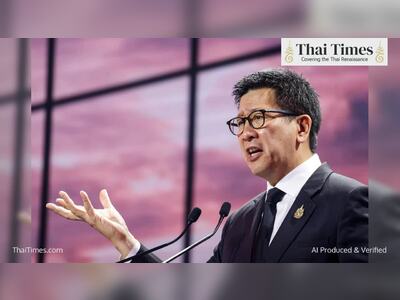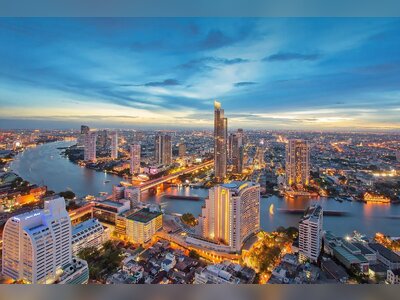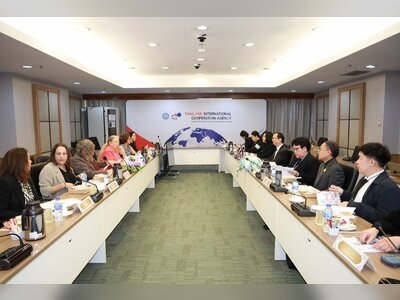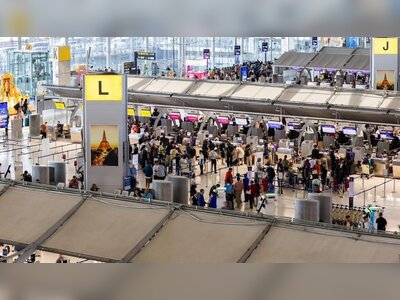Man Receives Parking Ticket 38 Years After Offense: ‘City Officials Said It’s Legitimate’
Woman Receives Gift Card for Christmas – Discovers It Is ‘Worth’ 63,000,000,000,000,000 Pounds
Red Lotus Sea Draws Global Attention After Lisa Showcases Thailand’s Iconic Bloom
Thailand Signals Opportunity After U.S. Court Orders Tariff Review Under Trump Framework
I Gave Andrew a Nude Massage Inside Buckingham Palace
Former UK Ambassador Peter Mandelson Arrested in Connection with Jeffrey Epstein
Thailand Prepares for Economic Impact as US Adopts Flat 15% Import Tariff
Thailand Earns Place Alongside Nordic Countries in Global Liveability Rankings
Thailand and Israel Advance Strategic Partnership at 6th Development Dialogue
Thailand to Raise Passenger Departure Fees from June in Airport Funding Overhaul
Thailand’s Crude Oil Imports Climb in January Amid Refinery Demand Rebound
MotoGP Confirms Full 2026 Thailand Grand Prix Schedule at Buriram
T.S. Lines to Join China–Thailand NT8 Shipping Service in Regional Expansion Move
Gen Natthaphon Says Not Contacted for New Cabinet Post, Calls for Permanent Fence at Khlong Luek–Thmor Dar Border
U.S. Pauses Immigrant Visa Processing for Cambodia and Thailand, Confounding Experts
Thailand’s BOI Endorses Over Ten Billion Baht Initiative to Establish First Humanoid Robot Parts Manufacturing Hub
Saskatchewan Seeks Expanded Post-Secondary Partnerships in the Philippines and Thailand
Thailand Sees Travel Surge as Chinese Tourists Return in Force
UAE Joins Global Airfare Surge as Eid Al Fitr Travel Drives Prices Higher
Thailand Faces Rising Competitive Pressure as Vietnam Gains Economic Momentum
Bridgeman Secures Maiden PGA Tour Victory at Riviera as Thitikul Triumphs in Thailand
Thai Meteorological Department Dismisses Rumours of 6.5-Magnitude Quake, Confirms No Impact from Malaysia Tremor
Record Prize Purse Announced for 2026 Honda LPGA Thailand as Player Payouts Detailed
Mark Zuckerberg Testifies in Trial Over Social Media's Impact on Children's Mental Health
Mexican Military Kills CJNG Leader Nemesio Oseguera Cervantes as Violence Erupts Across Jalisco
Thailand Ranked Among World’s 20 Most Liveable Countries for 2026
Thailand Confirms Jomtien Beach Safe for Swimming After Intensive Water Quality Review
Thailand Secures Limited Relief as US Tariff Decision Eases Pressure on Exports
South Korea Overtakes Regional Rivals to Become Japan’s Top Source of Record Tourist Arrivals
Thailand Intensifies Nationwide Gun Control Measures Following Security Review
Thailand Raises 2026 Economic Growth Forecast on Tourism and Export Momentum
Thailand Raises Passenger Service Charges at Six Major International Airports
Thailand’s Pivotal Election Marks Generational Shift as Young Progressive Leader Leads Polls
Thailand’s Cannabis Policy in 2026: From Liberalisation to Tighter Medical Oversight
Report Alleges Russia Routing Chinese Drones Through Thailand to Bypass Sanctions
OpenAI CEO Sam Altman praises the rapid progress of Chinese tech companies.
New electric vehicle charging service eliminates waiting times
North Korea's capital experiences a significant construction boom with the development of a new city district dubbed 'Pyonghattan'.
Why Phuket Remains Thailand’s Premier Nightlife Destination
Vandana Shiva reminding the world that Bill Gates did not invent anything.
Berli Jucker to Acquire MM Mega Market Vietnam in $720 Million Deal
Ex-Wife of ASOS Co-Founder Denies Involvement in Thailand Balcony Death
Asos Co-Founder Dies After Balcony Fall in Thailand
Round Two at Honda LPGA Thailand 2026 Delivers Tight Leaderboard Battle
Thai Authorities Move Swiftly After Virus Outbreak Kills 72 Captive Tigers
Thailand Launches Ambitious E-sports Development Strategy to Enhance Digital Economy
Thailand Welcomes Japanese Firms as Political Stability Boosts Investment Confidence
Thailand's Minor International Launches Singapore REIT and Plans Hong Kong IPO to Boost Global Expansion
Thailand's True Corporation Achieves Profit Stability, Enhancing Investor Confidence
Thailand Announces Global Conferences to Enhance Wellness and Sustainable Tourism











